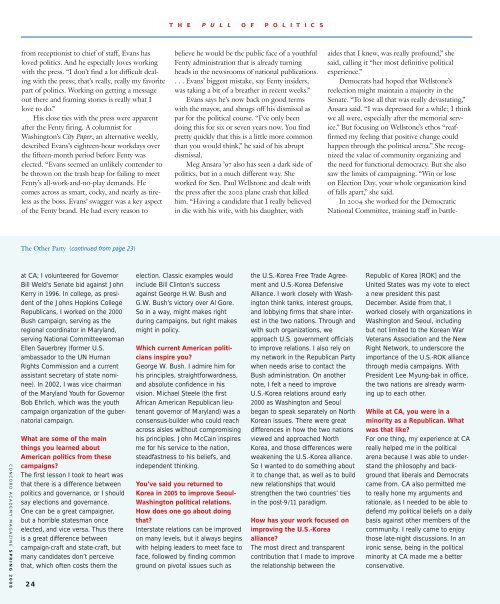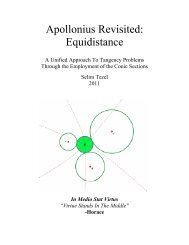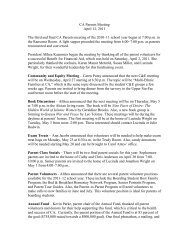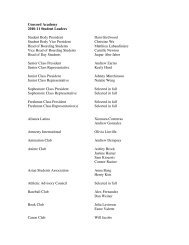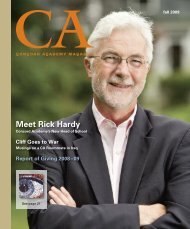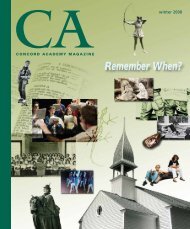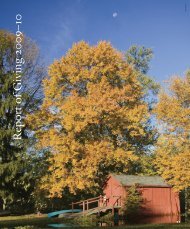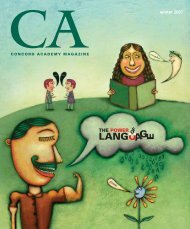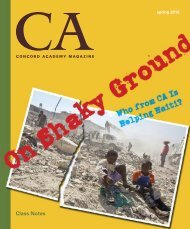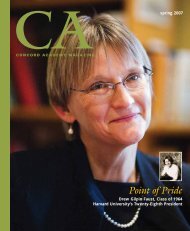WWW.CONCORDACADEMY.ORG
The Pull of Politics - Concord Academy
The Pull of Politics - Concord Academy
- No tags were found...
Create successful ePaper yourself
Turn your PDF publications into a flip-book with our unique Google optimized e-Paper software.
T H E P U L L O F P O L I T I C Sfrom receptionist to chief of staff, Evans hasloved politics. And he especially loves workingwith the press. “I don’t find a lot difficult dealingwith the press; that’s really, really my favoritepart of politics. Working on getting a messageout there and framing stories is really what Ilove to do.”His close ties with the press were apparentafter the Fenty firing. A columnist forWashington’s City Paper, an alternative weekly,described Evans’s eighteen-hour workdays overthe fifteen-month period before Fenty waselected. “Evans seemed an unlikely contender tobe thrown on the trash heap for failing to meetFenty’s all-work-and-no-play demands. Hecomes across as smart, cocky, and nearly as tirelessas the boss. Evans’ swagger was a key aspectof the Fenty brand. He had every reason tobelieve he would be the public face of a youthfulFenty administration that is already turningheads in the newsrooms of national publications.. . . Evans’ biggest mistake, say Fenty insiders,was taking a bit of a breather in recent weeks.”Evans says he’s now back on good termswith the mayor, and shrugs off his dismissal aspar for the political course. “I’ve only beendoing this for six or seven years now. You findpretty quickly that this is a little more commonthan you would think,” he said of his abruptdismissal.Meg Ansara ’97 also has seen a dark side ofpolitics, but in a much different way. Sheworked for Sen. Paul Wellstone and dealt withthe press after the 2002 plane crash that killedhim. “Having a candidate that I really believedin die with his wife, with his daughter, withaides that I knew, was really profound,” shesaid, calling it “her most definitive politicalexperience.”Democrats had hoped that Wellstone’sreelection might maintain a majority in theSenate. “To lose all that was really devastating,”Ansara said. “I was depressed for a while; I thinkwe all were, especially after the memorial service.”But focusing on Wellstone’s ethos “reaffirmedmy feeling that positive change couldhappen through the political arena.” She recognizedthe value of community organizing andthe need for functional democracy. But she alsosaw the limits of campaigning. “Win or loseon Election Day, your whole organization kindof falls apart,” she said.In 2004 she worked for the DemocraticNational Committee, training staff in battle-The Other Party (continued from page 23)CONCORD ACADEMY MAGAZINE SPRING 2008at CA; I volunteered for GovernorBill Weld’s Senate bid against JohnKerry in 1996. In college, as presidentof the Johns Hopkins CollegeRepublicans, I worked on the 2000Bush campaign, serving as theregional coordinator in Maryland,serving National CommitteewomanEllen Sauerbrey (former U.S.ambassador to the UN HumanRights Commission and a currentassistant secretary of state nominee).In 2002, I was vice chairmanof the Maryland Youth for GovernorBob Ehrlich, which was the youthcampaign organization of the gubernatorialcampaign.What are some of the mainthings you learned aboutAmerican politics from thesecampaigns?The first lesson I took to heart wasthat there is a difference betweenpolitics and governance, or I shouldsay elections and governance.One can be a great campaigner,but a horrible statesman onceelected, and vice versa. Thus thereis a great difference betweencampaign-craft and state-craft, butmany candidates don’t perceivethat, which often costs them the24election. Classic examples wouldinclude Bill Clinton’s successagainst George H.W. Bush andG.W. Bush’s victory over Al Gore.So in a way, might makes rightduring campaigns, but right makesmight in policy.Which current American politiciansinspire you?George W. Bush. I admire him forhis principles, straightforwardness,and absolute confidence in hisvision. Michael Steele (the firstAfrican American Republican lieutenantgovernor of Maryland) was aconsensus-builder who could reachacross aisles without compromisinghis principles. John McCain inspiresme for his service to the nation,steadfastness to his beliefs, andindependent thinking.You’ve said you returned toKorea in 2005 to improve Seoul-Washington political relations.How does one go about doingthat?Interstate relations can be improvedon many levels, but it always beginswith helping leaders to meet face toface, followed by finding commonground on pivotal issues such asthe U.S.-Korea Free Trade Agree -ment and U.S.-Korea DefensiveAlliance. I work closely with Wash -ing ton think tanks, interest groups,and lobbying firms that share interestin the two nations. Through andwith such organizations, weapproach U.S. government officialsto improve relations. I also rely onmy network in the Repub lican Partywhen needs arise to contact theBush administration. On anothernote, I felt a need to improveU.S.-Korea relations around early2000 as Washington and Seoulbegan to speak separately on NorthKorean issues. There were greatdifferences in how the two nationsviewed and approached NorthKorea, and those differences wereweakening the U.S.-Korea alliance.So I wanted to do something aboutit to change that, as well as to buildnew relationships that wouldstrengthen the two countries’ tiesin the post-9/11 paradigm.How has your work focused onimproving the U.S.-Koreaalliance?The most direct and transparentcontribution that I made to improvethe relationship between theRepublic of Korea [ROK] and theUnited States was my vote to electa new president this pastDecember. Aside from that, Iworked closely with organizations inWashington and Seoul, includingbut not limited to the Korean WarVeterans Association and the NewRight Network, to underscore theimportance of the U.S.-ROK alliancethrough media campaigns. WithPresident Lee Myung-bak in office,the two nations are already warmingup to each other.While at CA, you were in aminority as a Republican. Whatwas that like?For one thing, my experience at CAreally helped me in the politicalarena because I was able to understandthe philosophy and backgroundthat liberals and Democratscame from. CA also permitted meto really hone my arguments andrationale, as I needed to be able todefend my political beliefs on a dailybasis against other members of thecommunity. I really came to enjoythose late-night discussions. In anironic sense, being in the politicalminority at CA made me a betterconservative.


